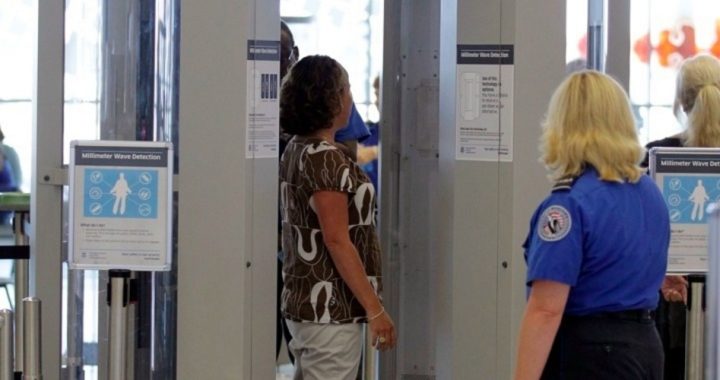
A federal appeals court has given the Transportation Security Administration another six months to comply with the court’s 14-month-old order to “promptly” hold public hearings on the use of nude body scanners used at airport security checkpoints, Wired, a science and technology magazine and online publication, reported Wednesday.
The U.S. Circuit Court of Appeals for the District of Columbia Circuit issued the order on June 15, 2011, when it set aside an appeal from the Electronic Privacy Information Center, charging the use of the scanners is an unconstitutional invasion of privacy. The court ordered the TSA “to act promptly” in holding public hearings and to publicly adopt rules and regulations about the scanners’ use. The court ruled the agency violated the Administrative Procedures Act by failing to provide a 90-day public comment period when it adopted the Advanced Imaging Technology for use in passenger screenings at airports. TSA officials argued that a public comment period would hinder the agency’s ability to respond to “ever-evolving threats.”
On August 1 of this year, the court ordered the agency to explain why it had not complied with the order. TSA said it expected to publish, by the end of February, a notice in the Federal Register opening up the Advanced Imaging Technology scanners to public comments and public hearings. “That would be 19 months after the court order,” Wired noted. On Tuesday the court gave the agency until the end of March to comply.
The TSA denied the claim by the Electronic Privacy Information Center that it was stonewalling the court’s order. The agency said it was having staffing issues and was awaiting approval from the Department of Homeland Security and the Office of Management and Budget before it releases public documents associated with its 2009 decision to make the body scanners the primary security apparatus at the nation’s airports.
Public comments and the agency’s answers to them may be reviewed by a court, which would open a new avenue for a legal challenge to the use of the scanners, Wired said. Critics claim the scanners, which use radiation to peer through clothes, pose a health threat as well as an invasion of privacy, charges the TSA has denied.
Both the scanners and the “pat down” alternative used by airport screeners have raised the hackles of air travelers throughout the country and have given rise to many a “horror story” concerning their abuse. In his new book, Government Bullies, U.S. Senator Rand Paul (R-Ky.) cites several examples, including the case of a six-year-old girl from Paul’s hometown of Bowling Green, who, the senator wrote, “was subjected to a ridiculously invasive search despite her parents’ objections.” A former Miss USA who endured the pat down procedure claimed a TSA agent “actually felt and touched my vagina.” A survivor of bladder cancer endured the embarrassment and discomfort of having his urostomy bag burst, drenching him in urine, during a TSA pat down.
Paul had a run-in of his own with the TSA when he refused to submit to a pat down, insisting instead on a rescreening after the routine screening by the scanner showed an irregularity. He was detained in a 10-foot-square area reserved for potential terrorists, he wrote, adding:
I neither asked for nor expected any special treatment for being a U.S. senator. But my experience wasn’t really about me at all. It was about every single one of us. It was about how we are sick of our increasingly arrogant and intrusive government.
Paul has introduced the Air Traveler” Bill of Rights, a 10-point legislative proposal that would allow airports to opt out of the TSA regime in favor of a private screening contract, and would require a separate screening process for pre-cleared frequent fliers. It would guarantee the right of travelers who fail an imaging or metal detector test to be rescreened rather than subjected to a pat down. It would eliminate pat downs altogether for children age 12 and under, guarantee the right of parents to remain with their children during screenings, and recognize a traveler’s right to contact an attorney when detained by airport authorities.
The Kentucky senator has also introduced a bill to privatize airport security operations. The airlines and the companies they would hire for passenger screenings, he believes, would be less inclined than the TSA to pat down six-year-olds and their grandmothers and more likely to check out the frequent flyer to Yemen and the Nigerian traveler who somehow managed to board a plane with expired boarding passes and no identification.
Paul also noted an interesting fact about the scanners. The first orders for them were placed by the Department of Homeland Security under then-Secretary Michael Chertoff in 2005. After leaving DHS, Chertoff became a lobbyist for Rapiscan, the manufacturer of the scanners. After the “underwear bomber” incident on Christmas Day, 2009, Chertoff, as former head of the DHS, showed up in numerous TV interviews, offering his expert opinion on the urgent need for Advanced Imaging Technology at airports throughout the land.
“But did any reporter attempt to investigate exactly what and who he was advocating for?” Paul wrote. “Michael Chertoff, former head of Homeland Security and current spokesman for the scanner industry was advocating for nearly $250 million in sales for his industry.”
That, it might be said, provides at least provides some level of financial security for Rapiscan and the “scanner industry.”
Photo: AP Images



